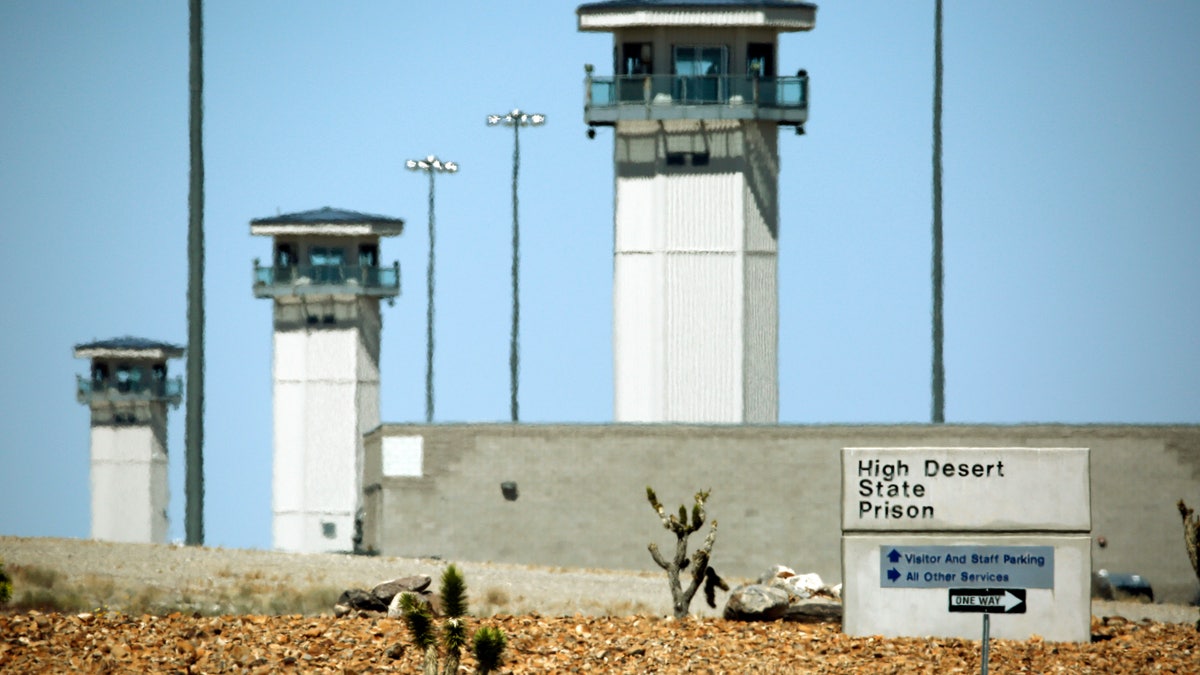
FILE - April 15, 2016: Guard towers are seen at High Desert State Prison in Indian Springs, Nev. (AP Photo/John Locher)
Like most dads in America I will fire up the grill this Sunday in celebration of Father’s Day. Nothing makes me happier than being surrounded by my family on special days like this. It is an important time to reflect on the meaningful role we play in our kids’ lives.
But for two years, there was no gathering for Father’s Day in our home. I was an absent father, not by choice, but because I was a federal prisoner, inmate 06833-097. My children didn’t understand any of the legal issues. They only knew that their dad was not home with them, and they felt abandoned.
They hadn’t done anything wrong, but nevertheless they were paying a big price. This is a major problem across the country.
This Father’s Day over 2.5 million of our nation’s children will spend Father’s Day without their father who is out of reach behind bars in prison or jail. The Pew Charitable Trusts found that one in 28 children in the United States has a parent that is incarcerated.
Given the heavy toll incarcerating a parent takes on most kids, it makes sense to place lower-level offenders under mandatory supervision in the community, allowing them to remain connected to family, gainfully employed and available to nurture their children.
Prison is certainly the right place for violent and career criminals, and some offenders commit crimes that endanger their own children. But many prisoners are not dangerous, and separating them from their families is not necessary to hold them accountable for their crimes and keep the public safe. Prisons are for people we are afraid of but we are imprisoning many people we are just mad at.
Holding low risk offenders in jail and prison comes at a high cost, not just in terms of state budgets, but also the toll it takes on children and families, the innocent casualties left behind.
The Pew Charitable Trusts found that imprisonment of a parent increases the likelihood a child will live in poverty, as most ex-offenders struggle to find jobs upon release. Children of the incarcerated frequently land in foster care, have trouble in school and struggle to form attachments with peers.
Without strong authority figures and positive role models in their lives, too many of these children slide into delinquency and land in jail themselves.
Given the heavy toll incarcerating a parent takes on most kids, it makes sense to place lower-level offenders under mandatory supervision in the community, allowing them to remain connected to family, gainfully employed and available to nurture their children.
The American Conservative Union Foundation (ACUF) works to apply conservative principles to the problems confronting our country. One of the most serious areas of concern is the disintegration of American families, which contributes to the erosion of our culture. The criminal justice system, particularly the separation of parents from their children, is an example of where unintended consequences of government policies are jeopardizing family cohesion.
Given the heavy toll incarcerating a parent takes on most kids, ACUF supports placing lower-level offenders under mandatory supervision in the community, allowing them to remain connected to family, gainfully employed and available to nurture their children.
As for those we do incarcerate, ACUF believes that family preservation should be a top priority for corrections officials.
Sadly, many prison policies make it very hard for families to remain in touch. These policies need to be changed to promote family contact:
• Most inmates are imprisoned hundreds of miles from their families, without public transportation available for their families to come for visits.
• Many prisons prohibit relatives other than the custodial parent from bringing their children to visit their parent. Thus, the caregiver that often works two jobs to support the family is the only one who can bring the children to visit. No grandparents, aunts or brothers are allowed to bring them.
• Other prisons prohibit children from visiting unless the incarcerated parent is listed on their birth certificate. This cuts off contact for parents not listed, and places them in a Catch-22 because many states consider failure to visit or communicate with a child in foster care as grounds to terminate all parental rights.
• Most jails and prisons limit prisoners to collect calls, charging exorbitant rates to their families, who are among the poorest residents of the U.S. Some states charge as much as $3.95 to place the call plus $0.89 per minute. Families are prohibited from using discount cards that allow the rest of us to make calls for less than 10 cents a minute.
These policies undercut family ties, and work against successful rehabilitation of offenders. Of all the factors that help inmates after their release, an intact family is the most important in helping them stay on the right path.
Research shows that when returning inmates have a supportive family, they are more likely to find a job, less likely to use drugs, and less likely to be involved in criminal activities. The support and accountability that a stable family provides have a clear, positive impact.
Studies also show that children of inmates who are able to visit with their parents have increased cognitive skills, improved academic self-esteem, and greater self control, and they change schools much less often. The improvement of the children has an amazing impact on the incarcerated parent, too, with significantly reduced recidivism of the parent after release.
ACUF is a partner in the Right on Crime movement of conservatives working to reform the criminal justice system.
We hope you will join us in supporting these reforms. The result will be stronger families and safer communities. And more children united with their fathers to celebrate Father’s Day.




















